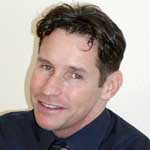-
- Same-sex couples prepare for next step in marriage war
- San Francisco spree of marriages for gays and lesbians continues
- Rep. Barney Frank opposes San Francisco’s effort
- Bush to back constitutional ban on marriage for gays and lesbians
- Chicago Mayor Daley says he has ‘no problem’ with same-sex couples
- Fix to human rights law passes New Mexico Senate
- Protesters urge removal of justices Say amending constitution is not the answer
- National News Briefs
- World News Briefs
commentary
The menace plaguing San Diego
Published Thursday, 26-Feb-2004 in issue 844
BEYOND THE BRIEFS
We still smell the ashes from the recent fires. We know that the reason why the City of San Diego was helpless to fight the fires that destroyed thousands of homes was because we didn’t have adequate fire-fighting helicopters. We couldn’t afford them.
The City also faces a $1 billion deficit in its pension program.
San Diego Police Department Chief William Landsdowne declared a crisis in his Department because its squad cars are obsolete and the Department lacks new officers.
Juxtaposed against this was release from SDPD that it is devoting its depleted and inadequate resources to fight a crime epidemic. Unsolved murders and rapes? How about all those car “smash and takes” that those of us in District 3 suffer from?
No. The crime wave that needs such focus is prostitution via the Internet.
There’s not enough money at the City to buy a new fire engine, so says the fire chief. In fact, there are vehicles in use that were built when Dwight Eisenhower was President.
Apparently, according to news reports, SDPD has created its own website featuring beautiful women on its pages. The site is designed to get straight men to solicit the women on-line for sexual services.
Other reports suggest that police will also be looking at men and women who offer “escort” and “massage” services online.
This crackdown on internet prostitution comes at a time when news reports indicate that women involved in street prostitution may be sexual slaves. These are women, kidnapped from their home countries, brought to the United States and sold into prostitution. Some may be on the streets of San Diego, forced to work as prostitutes, giving their money to their captors.
Also, the Union-Tribune reported how young girls, as young as thirteen and younger, have been forced into prostitution by young men, some involved in gangs.
Now this is the type of crime that deserves the full attention of SDPD.
My concern here is not so much for prostitues and their johns. It’s really for gay men and lesbians who may be caught up in police stings like this yet are not prostitutes. California law makes it a crime to exchange sexual services for any type of consideration. Usually it’s money exchanged.
The California courts, however, have limited the reach of prostitution laws to sexual acts involving touching. Under the First Amendment (freedom of speech), the courts protect “lap dances” and “nude modeling.” Sex acts must involve or contemplate actual touching.
Most police departments throughout the country confine their efforts to thwarting “public prostitution” that endangers a surrounding community.
Statistics show that neighborhoods besieged by prostitution also have increases in homicide, robbery, burglary and other crimes. The people who live in the area suffer the blight; property owners see the value of their homes plummet.
No one can criticize a city or its police force from undertaking measures to eradicate a nuisance like public prostitution.
But “private prostitution” is another story.
Given the scarcity of police and fire resources, most San Diegans probably don’t find private prostitution between consenting adults to be a matter of great magnitude. This is particularly so when the transaction is freely made by both parties. In other words, there are no other coercive forces involved, such as pimps, etc.
Most San Diegans are more concerned with the crimes that directly affect them, such as car and home break-ins, identity theft, and domestic-related disputes, such as stalking and domestic violence.
My concern here is not so much for prostitutes and their johns. It’s really for gay men and lesbians who may be caught up in police stings like this and who are not prostitutes.
These are people who offer massages, but who do not meet the City’s rigorous requirement for being massage therapists (e.g., 500 hours of training). Or people who serve as “escorts,” but who are not licensed by SDPD to be such. Or, they are people who provide any type of service, but who do not have a business license.
Those people who do get caught in police stings are likely to have to register as “sex offenders” and may lose out later on chances to become licensed for a particular business or profession. (I’ve written in this column about teachers and real estate agents who have lost their ability to engage in their professions because of minor sex offenses).
It’s probably time for California courts to find that California laws prohibiting prostitution only apply to “public” solicitation of sexual acts in exchange for money. To the extent the parties conduct their affairs privately, those exchanges are protected under California’s broad right to privacy.
|
|
Copyright © 2003-2025 Uptown Publications


